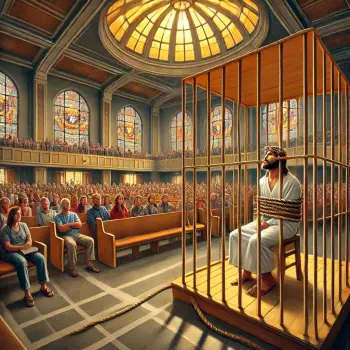
(Phot0 by ejsimpson.com)
I hope that the readers of this blog and the current series on race (this is the 6th post in this series: see post #1 here) have begun to realize that racism and our racist past is much worse than many have realized.
I hope they have also begun to consider that maybe the system has been set up, and perhaps still is, in such a way that fosters the oppression of people of color.
And, as I will establish even further over this and the next post, the Church has been a significant influence in promoting racial injustice.
NB: it is always relevant to mention that there were Christians who did not support slavery or lynchings or segregation and many advocated against them. This fact, however, does not get the Church off the hook. When White churches throughout a region ended early so they could catch the train, which had extra cars on the ready to accommodate the increased crowds, to watch the lynching of a Black person, there is a problem in the Church!
Christian complicity in America’s racist past.
Perhaps the Church’s most significant contribution for many of America’s racist practices has been in providing theological justifications. When it came to slavery the Church deemed it not only permissible but justifiable.
Some pastors and theologians proposed that the capturing of Africans and transporting them to America was for the good of the Africans because it gave them the opportunity to learn about Christ.
Consequently, horrendous injustices not only became justified but even celebrated. After all, the salvation of the slaves was of a far better consequence than their remaining in the darkness of pagan ways.
NB This argument fails to reckon with the fact that many slaves didn’t survive the journey to the Americas where they would find Christ. And it overlooks the fact that Christianity had come to the African continent more than a millennia earlier. The argument also fails to account for the countless people then and now who reject Christianity because of the Church’s history of engagement in such gross injustice.
Christians defending racists systems
The easiest way to defend a racist system is to deny the human dignity of the other. Simply make the other less than human, or a lesser human than oneself, and injustices are no longer injustices.
This was a common approach among slave owners in American history. In fact, the conviction that African slaves were less than human led some Christian slave owners to conclude that there was no need to evangelize slaves.[1] Why try to convert a creature that cannot be saved?
One writer notes, “The pre-1700 views that black slaves were less than fully human, did not possess souls, and were incapable of learning, as well as simple indifference by white Christians all led to a lack of interest in proselytizing slaves.”[2]
The conviction that Blacks were lesser persons significantly influenced the western church for centuries—and I wouldn’t be surprised if it were still true today.
(Feel free to use the comment section below to note any examples of how the Church today might sponsor racism)
For example, at the annual diocesan convention of the regional association of Episcopal Churches in 1846, St. Philip’s Church, the first black Episcopal church in New York City, applied for entrance to the denomination. After much debate, the committee denied their admission because, “They are socially degraded, and are not regarded as proper associates for the class of person who attend our Convention.”[3]
Tragically, others used this reasoning to suggest that slavery was for the betterment of the African slaves because they were brought to a higher civilization. The Presbyterian pastor Robert Dabney (1820-98) unequivocally stated: “Was it nothing, that this race, morally inferior, should be brought into close relations to a nobler race?”[4]
Contemporary author Jemar Tisby notes that Dabney even believed that if Africans were left to their own devices, they would only tend toward “lying, theft, drunkenness, laziness, [and] waste. . . . In Dabney’s theology, it was only through contact with the ‘nobler race’ of white people in a master-slave relationship that there was hope of elevating the ethics of Africans.”[5]
George Fitzhugh, a lawyer from Virginia, suggested that because Blacks were inferior it was actually for their long-term viability that they remain slaves: “The negro race is inferior to the white race, and living in their midst, they would be far outstripped or outwitted in the chase of free competition. Gradual, but certain, extermination would be their fate.”[6]
I cannot emphasize the point enough that racism was a part of the fabric of the dominant White led culture in the US prior to the ending of slavery. This fact alone makes it highly doubtful that racism ended with the emancipation proclamation. After all, racism was deeply ingrained in the hearts of many whites.
Were Whites really willing to suddenly change their way of thinking? Were they really willing to share their power? Were they really willing to surrender some of their prosperity and liberties?
Is Race a sin problem?
At beginning of this series on race, I suggested that racism is a sin problem. Now, I do not intend to suppose that race relations are purely a spiritual or religious issue, so that, if we were to solve the sin issues, the problems of racism and systemic injustices would cease.
Unfortunately, racist attitudes prevailed into the 20th century. The result was the continuation of systemic injustices against people of color.
In my next post, I will address the argument that segregation was established by God and that it was for the good all people. This conviction led Christian Whites to resist the government’s efforts to integrate the schools. The result of this resistance led to the explosive growth in the number and size of private Christian schools.
Good news: If you wish to view these posts on your smart phone, simply download the “tithe.ly church” app on your smart phone and insert “determinetruth” as the church name you wish to follow. Once it is loaded, simply click on the “blog” icon and they will automatically load.
If you have been blessed by this blog post and would like to see others benefit too, would you please consider giving a tax-deductible contribution to support determinetruth ministries and make possible future posts like this? You can do so by following this link: https://tithe.ly/give?c=3648601
If you would like to have Rob speak at your church or organization in person or via zoom, please let us know by filling out the contact info on the Contact me tab on this site.
If you would like to share your story, or if you have questions that you would like addressed in future posts, you may submit them in the Contact me tab on this site.
[1] Though many justified slavery because African slaves were being evangelized, others suggested that they were sub-human and not able to be evangelized. The problem they encountered was that once one believed they began to share the faith with the slaves, there were laws in place that forbid the enslavement of Christians. Consequently, many adhered to the conviction that slaves were not capable of receiving the gospel.
[2] Emerson, Divided by Faith (p. 22). Oxford University Press. Kindle Edition.
[3] Tisby, Jemar. The Color of Compromise (p. 56). Zondervan. Kindle Edition.
[4] Robert Lewis Dabney, A Defence of Virginia (and through Her, of the South) in Recent and Pending Contests against the Sectional Party (New York: E. J. Hale, 1867), 281. Cited in, Tisby, Jemar. The Color of Compromise (p. 226). Zondervan. Kindle Edition.
[5] Tisby, Jemar. The Color of Compromise (p. 81). Zondervan. Kindle Edition.
[6] Tisby, Jemar. The Color of Compromise (pp. 66-67). Zondervan. Kindle Edition.
















